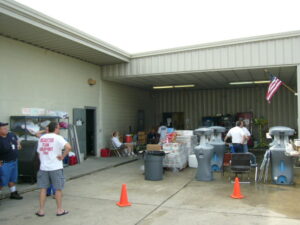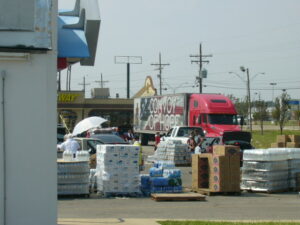
I arrived home last night after eight days in Gulfport, Mississippi.
As Hurricane Katrina hit, our ambulance company, which has a local base in Mississippi had already sent out a call to its divisions across the country for help. Ambulances and crews from California, Oregon, Washington, Texas, Florida, Georgia and New England were sent to the Gulf Coast to aid in rescue operations. They helped evacuate nursing homes, search for the dead, and provide emergency service, backing up the local crews, many of whom lost everything they had in the storm. Some of the out-of-state crews would work on the road during the day, and then after shift help the locals clear debris from their yards.
I was in the third wave of five employees from our division. Many more are waiting to be sent.
The company created a small city almost overnight. They got their communications running, raised tents to house the added employees, brought in truck loads of supplies and food and water. With all the problems regionwide in responding to the storm, whoever was in charge at the top of government could look down on their list of things to be done and put a check mark next to Mississippi EMS. It was covered.
Because it was a declared disaster as out of state medics we recieved reciprosity and were allowed to practice under our own local state or regional protocols. We were paired at first with either a local or an out-of-towner who’d been there a few days.
The job itself wasn’t much different from the normal. You get in your ambulance, are sent to a post, then a call comes in, and you respond. What was surreal was the scenery. The destruction, particuarly along the waterfront was astounding. Miles of beachfront homes, apartments and businesses were no longer there. Further inland were homes crumpled into piles of lumber, others with roofs torn off, windows blown out. The houses were spray painted with Xs by searchers, noting the time and what was found. If a number appeared under the X, it stood for the number of bodies found in the home’s rubble. A medic found a regular patient, known and loved by the local crews, drowned in her home. That house got a “1” under the X. They took a house sign from her destroyed home and posted it back at their headquarters with a note in loving memory of the woman they all had cared for.
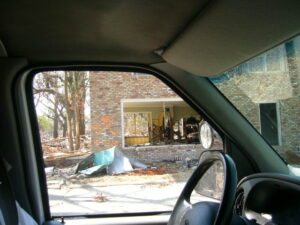
No one picture could describe the devestation. The lense isn’t wide enough to encompass the breadth. What you need is a video camera, and a slow drive along the beach road, recording the miles of destruction. A casino was ripped in half, with one half ending up a half mile down the road in the middle of the street.
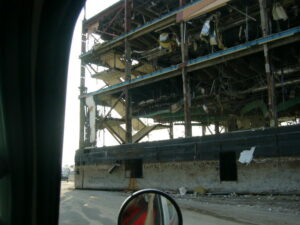
Giant hundred year old trees ripped out of the ground, crushing cars. Entire apartment complexes obilterated.
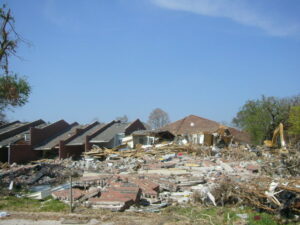
Where banks once stood were now only concrete slabs and the giant cement vaults. Nothing else. A church showing only its beams and steeple.
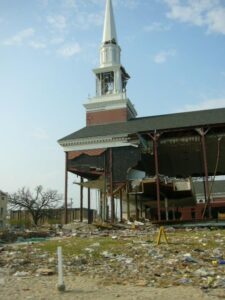
As we drove along the road, my local partner pointed out what was once there: a good place to get $1 breakfasts, a bar that people went to on Friday nights, an expensive condo complex, a historic home. All of it vanished.
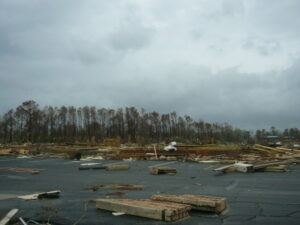
In thinking about what kind of force could make that damage I thought of Robert Johnson’s famous blues line. “A hellhound on my trail.”
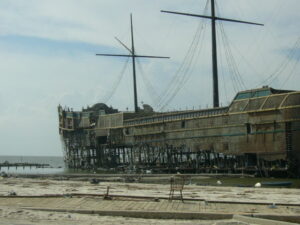
One partner I worked with told me how she and her partner were lost for two days during the storm, having to take refuge in first a fire station that later in a sewage treatment plant as the waters rose. At one point she and her partner were joking about how their car was going to need a little more than an “Orangeline Special” washing at the end of the day, at the next, they were wading in chest deep water as part of human chain trying to get to higher ground. She also told me about being sent into KMART in the darkness with only a flashlight to get needed radio supplies to get the communications system running, and suddenly getting very scared by an strange foreboding, and then hurrying to get the supplies and get out of the store. Later she heard that six corpses were found in the store along with four alligators.
In 100 degree heat we encountered a line of 5,000 people waiting to get Red Cross benefits. I pled with two women with cardiac histories to let me take them to the hospital. They had both been taking nitro to relieve the pressure in their chests, but they would not budge from the line. At least we got them sitting in chairs in the shade, watched by family. A man with an MI history — same deal — he wasn’t going until he got his check cut. He appreciated my concern, but he’d call later if it got worse. Several crews transported people who waited too long.
We did a lot of dehydration calls, and as the week went on — falls, as it was hard to find a roof that didn’t have someone up on it, hammering away. I did a patient who fell twenty feet through a roof, landing on cement and fracturing his pelvis along with some ribs. As I put him on oxygen and started running fluid wide open through his IV, even though he was pale, clammy and in obvious pain, he asked me where I was from and thanked me for coming down to help out.
EMS people often complain this is a thankless job, but I have never been thanked more than in this last week. From patients to store clerks to people on the street, thank you was all we heard. It made you feel good about your life’s choice of work.
What impressed me more than the devestation was the resiliency I saw in people’s eyes and their voices. You ask people for their address and they’d say, “Where I used to live or where I’m staying now?” Maybe they hadn’t hit the angry portion of the grieving process or maybe they just blew right on by it. I imagined what I would think if I saw my house flattened into a timber, a mound of wet irrecoverable junk. What would I grieve for — a crushed car, a smashed computer, a lifetime of collected books ruined by water and mud? Seeing it all piled together made me see how little material possessions mean. These people had made it through their darkest of storms, and in the morning, they looked at their homes, and what they saw rising out of the rubble of their old lives was their families, their grandparents, their mothers and father, their own children. “I lost everything, but my family made it through, praise mercy.” I heard that over and over again. “My family made it through.”
We worked 12 hour shifts, did three or four transports a day, in addition to giving out tetnus shots at gas stations, construction sites, and to anyone who came up and asked for one. We ate well — the company hired a chef from one of the casinos destroyed by the storm. Macaroni and cheese tastes a lot better with some crawfish, sausage and cajun spices added. The food was southern and good — catfish, country fried steak, grits, apple cobbler, gravy and biscuits for breakfast. On the road we had MRE’s. I particularly liked the Jambalaya. I slept well, thanks mainly to a pair of earplugs that keep out the symphony of EMSers’ snores.
Any time you step out of your own life and get to see the world in a new way, it can’t help but make you a better man. I was grateful for my chance to experience the Gulf Coast of Mississippi and it’s people. On Friday another five arrived from back home to replace us, and I was glad for them that they would get the opportunity I had to be a part of the rebirth down there.
As I was getting ready to go, one of the local workers came over and said, “Thank you for coming. We appreciate it.”
He held out his hand and we shook.
“You’re welcome. I know you’d come up for us if we needed the help.”
“You can sure put my name on that list,” he said.
As he walked away, I called after him, the words coming to me now. “Thank you,” I said, “For showing us what’s important.”
He smiled. “Sometimes the littlest things — that you sometimes forget about — are the biggest.”
I understood what he meant.
